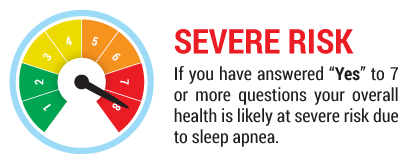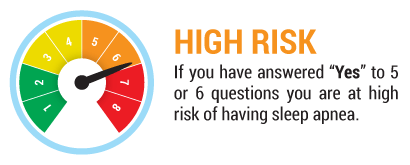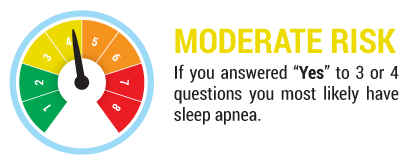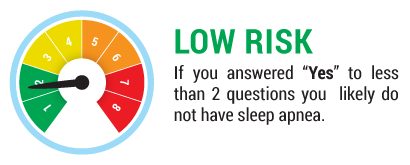The STOPBANG Test: Quick, Easy Sleep Apnea Screening
Posted: February 18, 2020
If you think you may have sleep apnea, the STOPBANG test is a helpful screening tool that can indicate your risk for having sleep apnea. This short medical questionnaire is a series of yes or no questions that help evaluate your likelihood of having moderate to severe sleep apnea. Therefore, if you snore, are frequently tired during the day, experience morning headaches, or notice changes in your libido, the STOPBANG test can help you and your provider determine if you’re a candidate for a home sleep apnea test.
With a higher STOPBANG score, your provider will likely recommend taking a home sleep test to rule out sleep apnea as the cause of your symptoms. This simple and effective test is your first opportunity for early sleep apnea detection, which can help save your life.
What is Sleep Apnea?
 Sleep apnea is a sleep disorder that causes you to stop breathing while you sleep. This serious condition affects an estimated 22 million Americans and can lead to many dangerous complications if left untreated. Sleep apnea events, or the periods where your breathing ceases or becomes very shallow, essentially suffocates your brain and vital organs. During apnea events, your blood oxygen levels can drop significantly, which can lead to other serious complications or even death.
Sleep apnea is a sleep disorder that causes you to stop breathing while you sleep. This serious condition affects an estimated 22 million Americans and can lead to many dangerous complications if left untreated. Sleep apnea events, or the periods where your breathing ceases or becomes very shallow, essentially suffocates your brain and vital organs. During apnea events, your blood oxygen levels can drop significantly, which can lead to other serious complications or even death.
Untreated sleep apnea increases your risk of having a stroke by two to three times. Additionally, sleep apnea sufferers not on a treatment plan for their condition increase their risk for a heart attack by nearly 30%. Nearly 60% of people with heart failure also have sleep apnea. Untreated sleep apnea makes you more likely to experience sudden cardiac death, likely due to the strain that it puts on your cardiovascular system.
In addition to these frightening statistics, sleep apnea sufferers also often experience difficulties in their day-to-day lives. Sleep apnea disrupts and fragments your sleep, which can lead to chronic fatigue, headaches, poor memory, and mood issues. Due to the poor sleep quality that sleep apnea causes, they are also more likely to experience car and work accidents. Therefore, sleep apnea is more than just a bad night’s sleep, it’s a serious condition that requires medical treatment.
Fortunately, sleep apnea diagnosis and treatment are simple and can help reduce your risk for many of the threats associated with the condition. We offer a free and easy screening tool to evaluate your risk for sleep apnea called the STOPBANG test. The STOPBANG test is a series of eight yes or no questions that can help you determine if you should be concerned about sleep apnea. Generally, if you score high on the STOPBANG test, you’re eligible for an easy, convenient, and affordable home sleep test for sleep apnea diagnosis.
How Does the STOPBANG Test Evaluate My Risk of Sleep Apnea?
So, what is the STOPBANG test? The STOPBANG test is an effective tool that physicians use to determine your risk for sleep apnea. This sleep apnea screening questionnaire generally takes less than 1-2 minutes to complete and can help you determine if you should take a home sleep test for sleep apnea diagnosis. This test’s name is an acronym for common symptoms and risk factors of sleep apnea.
The STOPBANG test is a questionnaire that asks you about snoring, tiredness, observed apnea, high blood pressure, body mass index, age, neck circumference, and gender. Your answers to these questions help your provider determine if you’re at risk of having sleep apnea.
For each “yes” answer you give, you score one point, while “no” answers are scored with a zero. You can score between zero and eight on the STOPBANG test to screen for your risk of sleep apnea. The higher your score is, the more likely it is that you have sleep apnea. Here is a more detailed breakdown of what the STOPBANG questions mean and how they assess the probability that you have sleep apnea:
Snoring
When you have difficulty breathing freely during sleep, the tissues near your nose and throat vibrate, creating that well-known snoring sound. While many factors can influence snoring, it’s a common sign of sleep apnea. As many as 45 million Americans who snore also have sleep apnea. The STOPBANG uses your answer to determine whether you are at risk for having moderate to severe sleep apnea using common symptoms and risk factors of sleep apnea, like snoring.
Tiredness
 Sleep apnea affects your sleep quality, so people with the condition often feel tired during the day. Each time you stop breathing at night, your body interrupts your sleep to help you breathe again. Whether you notice that you wake up at night or not, sleep apnea can disrupt your sleep health and cause you to feel tired or drowsy during the day, even if you slept the recommended 8-12 hours the night before. Since this is a common symptom of sleep apnea, it is included on the STOPBANG test.
Sleep apnea affects your sleep quality, so people with the condition often feel tired during the day. Each time you stop breathing at night, your body interrupts your sleep to help you breathe again. Whether you notice that you wake up at night or not, sleep apnea can disrupt your sleep health and cause you to feel tired or drowsy during the day, even if you slept the recommended 8-12 hours the night before. Since this is a common symptom of sleep apnea, it is included on the STOPBANG test.
Observed Apnea
Observed apnea is when someone, usually your partner, notices that you stop breathing while you sleep. Oftentimes, sleep apnea sufferers may not realize that their symptoms are due to untreated sleep apnea until a partner tells them they’ve seen them have an apnea event. Therefore, if someone has told you that you stop breathing, choke, or gasp during your sleep, you should answer yes to this STOPBANG question. This is an indicator that you may have sleep apnea.
Pressure
High blood pressure can be a symptom of sleep apnea, as sudden drops in oxygen from breathing cessation events at night can increase your blood pressure and put significant stress on your cardiovascular system. In untreated sleep apnea sufferers, high blood pressure may be difficult to control. Therefore, high blood pressure is included in the STOPBANG test.
Body Mass Index
Your body mass index, or BMI, can also indicate a risk for sleep apnea. A BMI over 35 kg per m2 often indicates obesity, which is a major risk factor for sleep apnea. Our STOPBANG test includes a free BMI calculator to help you easily determine your score.
Obesity increases the fatty tissue in your neck, which can put pressure on your air way and cause it to compress during the night. Additionally, obesity puts extra stress on your respiratory system, which can also make it more difficult to breathe at night. Obesity is both a risk factor and often a symptom of sleep apnea, as sleep apnea-related fatigue can make it difficult to maintain a healthy weight.
Age
While you can have sleep apnea at any age, once you reach 50-years-old, your risk of sleep apnea increases. This is because your throat generally gets narrower as you age and you typically start to lose muscle tone in your neck, allowing fatty tissue to put pressure on your air way. Therefore, people over 50-years-old will score a point on this portion of the STOPBANG test.
Neck Circumference
The STOPBANG test also asks whether your neck circumference is greater than 15.75 inches. For men, this translates to a shirt collar that is 17 inches or larger. A larger neck can push on your air way, which can cause apnea events during the night when your throat relaxes. Therefore, a larger neck circumference is a risk factor of sleep apnea and included on the STOPBANG test.
Gender
Men are two to three times more likely to suffer from sleep apnea. Evidence suggests that this may be because men have narrower air passages than women, increasing their likelihood of having sleep apnea. Therefore, if you are male, you will score one point on this portion of the STOPBANG test, as it puts you at a higher risk of having sleep apnea.
Therefore, for a quick, effective evaluation of your risk for sleep apnea, take the STOPBANG test to find out your results. This test can help you determine whether you need sleep apnea testing for your symptoms.
How Effective is the STOPBANG Test?
 The STOPBANG test is one of the most sensitive and easy to administer sleep apnea screening tool available. Studies show that it has an 84% success rate at detecting patients with any sleep apnea, which is any time a person experiences five or more apnea events per hour while they sleep. When your breathing ceases or becomes shallow for at least ten seconds during sleep, this is considered an apnea event. For moderate sufferers who experience an average of 15 or more apnea events each hour, the STOPBANG test has a 93% detection rate. Finally, for severe sleep apnea patients, who experience a whopping 30 or more apnea events per hour of sleep, this test has a 100% detection rate.
The STOPBANG test is one of the most sensitive and easy to administer sleep apnea screening tool available. Studies show that it has an 84% success rate at detecting patients with any sleep apnea, which is any time a person experiences five or more apnea events per hour while they sleep. When your breathing ceases or becomes shallow for at least ten seconds during sleep, this is considered an apnea event. For moderate sufferers who experience an average of 15 or more apnea events each hour, the STOPBANG test has a 93% detection rate. Finally, for severe sleep apnea patients, who experience a whopping 30 or more apnea events per hour of sleep, this test has a 100% detection rate.
The higher your score, the higher probability that you suffer from sleep apnea. Therefore, the STOPBANG has become a standard medical screening tool for sleep apnea due to its accuracy for indicating sleep apnea. We offer you the ability to take your STOPBANG test conveniently online so you can determine whether you should take a home sleep test for sleep apnea diagnosis. Once you’ve taken the STOPBANG test, you can use your score to evaluate whether a home sleep test could will be helpful for you.
What Does My Score Mean?
After you have taken the STOPBANG test to screen for sleep apnea, you’ll be given a score between zero and eight. With each point, the probability that you have sleep apnea increases. Your score relates to how high your risk is for sleep apnea. Here is a guide to STOPBANG scores:




A score of three or more is a sign that you could benefit from a home sleep test analysis by our board-certified sleep doctor. We offer you several flexible options for sleep apnea testing so you can choose a path that fits your lifestyle. Take the first step toward addressing your sleep health and take our STOPBANG preliminary sleep apnea test. With treatment, you can reduce your risk factors for other serious conditions and complications associated with sleep apnea.
At the Low T Sleep Center, our team is here to help you improve your health and address your symptoms. We believe men’s healthcare should be convenient, accessible, and affordable, which is why we offer a variety of diagnostic and treatment options to help you get to the bottom of your symptoms. Schedule an appointment or order your home sleep test online today to learn more about how you can improve your health.
Related Posts
Disclaimer: This article is made available for general, entertainment and educational purposes only. The opinions expressed herein do not necessarily reflect those of Low T Center. You should always seek the advice of a licensed healthcare professional.
